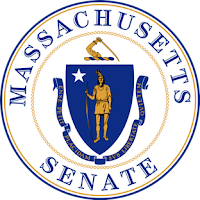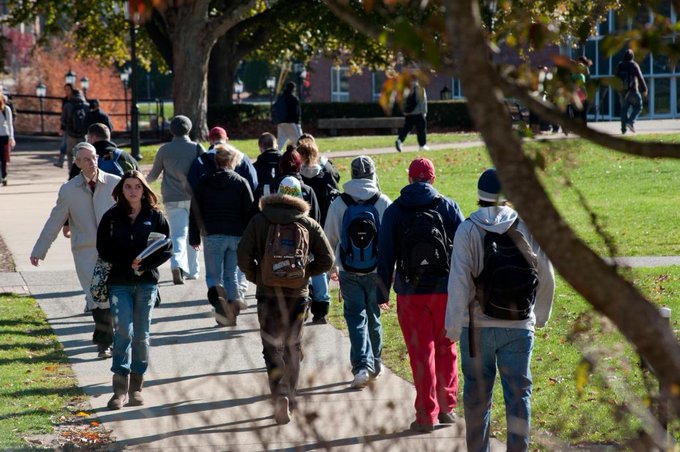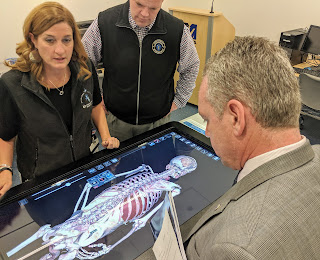Under An Act Creating Higher Education Opportunities for Students with Intellectual and Developmental Disabilities, students would not be required to pass the MCAS, have a high school diploma, meet minimum requirements for academic courses, or take college entrance exams in order to access inclusive academic, social, and career development opportunities on college campuses with their peers. In addition, the bill also makes clear that strengthening access to higher education for students with disabilities is a goal of the Commonwealth's higher education system.
"We have made great strides in Massachusetts to provide inclusive opportunities for persons with disabilities, but there is always more work to be done," said Senate President Karen E. Spilka (D-Ashland). "I appreciate the overwhelming support for advancing this bill and look forward to seeing it make its way through the legislative process. I would like to thank Senators Rodrigues, Lovely and Gobi for their attention to this important issue."
"As we honor the 30th anniversary of the Americans with Disabilities Act, the Senate's passage of this bill today marks another important step towards removing barriers, creating access and opening doors of opportunity and possibility for individuals with disabilities," said Senator Michael J. Rodrigues (D- Westport) Chair, Senate Committee on Ways and Means. "I applaud Senator President Spilka for her support and leadership, Senator Lovely for her commitment to this critical issue, and our partners—school districts and public higher education institutions—for their collaborative efforts to ensure full inclusion of individuals with disabilities within our Commonwealth."
"A little more than thirty years after the Americans with Disabilities Act became U.S. law, I am proud that the Senate has expanded this legacy by passing An Act Creating Higher Education Opportunities for Students with Intellectual and Developmental Disabilities," said Senator Joan B. Lovely (D-Salem). "Breaking down barriers to higher education for persons with developmental and intellectual disabilities so they can enroll in college courses and participate in extracurricular activities represents a right and long overdue step for young people of all abilities. I am excited to see all of the great changes that will result if this bill becomes law, and am deeply appreciative to Senate President Spilka and Ways & Means Chair Rodrigues for their visionary leadership."
"The opportunity to attend one of our many state community colleges, colleges and universities and the further opportunities that creates in life is something that many people strive for. All students deserve that regardless of their abilities," said Senator Anne Gobi (D-Spencer), co-chair of the Joint Committee on Higher Education.
"As we celebrate the 30th anniversary of the groundbreaking Americans With Disabilities Act, I commend Senate President Spilka, Chairman Rodrigues, Speaker DeLeo, House Speaker Pro Tempore Haddad and their colleagues in the Legislature for creating opportunities in higher education for students with intellectual and developmental disabilities," said University of Massachusetts President Marty Meehan. "This legislation builds on the university's ongoing efforts to expand access to higher education through innovative programming."
"Now, on the 30th anniversary of the ADA, the strongest civil rights law in the nation for people with disabilities, we at the MDSC applaud Senate President Spilka, Chair Rodrigues, Senator Lovely and members of the Massachusetts State Senate for passing Senate Bill S. 2844, which will open doors of opportunity for students with intellectual disabilities to gain access to higher education opportunities in an inclusive college setting," said Maureen Gallagher, Executive Director of the Massachusetts Down Syndrome Congress. "For too long, public school options for students with intellectual disabilities transitioning to adulthood have been limited and the passage of this bill removes those existing barriers and ensures that people with intellectual disabilities have access to higher education that will lead to more opportunities for meaningful integrated employment and a fulfilling life in the community."
"We are proud that many community colleges are already experienced with inclusive concurrent enrollment programs, and know first-hand that participating students gain life skills and education that increase their ability to live more empowered, independent, and inclusive lives," said Tom Sannicandro, Director of the Massachusetts Association of Community Colleges. "This bill creates a life changing opportunity by breaking down barriers to higher education for students with disabilities. We are happy to see the bill move forward to expand this critical program to more students in Massachusetts."
"MAC applauds the Senate, our public higher education institutions, and school districts for working together to enact legislation that will remove barriers and provide access," said Julia Landau, Senior Project Director of Mass Advocates for Children. "With this bill, persons with intellectual disabilities and autism will be able to participate in college and gain the skills necessary to successfully live and work in the community."
"Advocates for Autism of Massachusetts strongly supports Senate passage of S. 2844, to provide college access for individuals with disabilities," said Michael J. Borr, President and Chair of AFAM. "This higher education initiative can significantly change the trajectory of life for a young adult with autism. Participating in college courses alongside their peers, provides people with autism needed opportunities for growth and community inclusion. The CDC estimates that 2.21% of adults are diagnosed with autism and approximately 80% are unemployed. Many of these individuals would benefit greatly from the skill sets and much improved employment outcomes that this legislation provides."
Building on the success of the Massachusetts Inclusive Concurrent Enrollment Initiative (MAICEI) grant program, the bill codifies that program, which enables school districts and public institutions of higher education to partner together to offer inclusive concurrent enrollment initiative options for students with disabilities ages 18 to 22. Since 2007, over 1,200 students with disabilities have taken advantage of the opportunity to participate academically and socially in the life of participating colleges in Massachusetts through the MAICEI program.
In response to the challenges facing school districts and public higher education institutions during the COVID-19 pandemic, the Senate bill ensures no additional costs are placed on a school district beyond the existing obligations already required under state and federal special education law.
Furthermore, the bill also ensures that colleges are not required to bear any additional costs of providing individual supports and services for students with severe intellectual disabilities, severe autism spectrum disorders, or other severe developmental disabilities who attend the college through the MACEI initiative.
Finally, the bill delays the implementation of the requirements placed on our school districts and higher education institutions within the bill until the 2021–2022 school year.
The bill now heads to the Massachusetts House of Representatives.
 |
| Senate Passes Bill to Increase Higher Education Opportunities for People with Disabilities |








